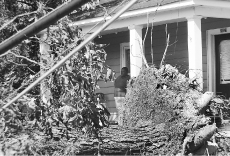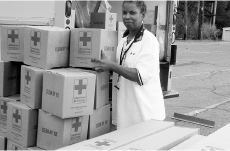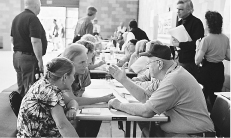|
|
|
|
Returning Home
Returning home can be both physically and mentally challenging. Above all, use caution.
General tips:
Keep a battery-powered radio with you so you can listen for emergency updates and news reports. Use a battery-powered fl ash light to inspect a damaged home.
Note: The fl ashlight should be turned on outside before entering—the battery may produce a spark that could ignite leaking gas, if present. Watch out for animals, especially poisonous snakes. Use a stick to poke through debris. Use the phone only to report life-threatening emergencies. Stay off the streets. If you must go out, watch for fallen objects; downed electrical wires; and weakened walls, bridges, roads, and sidewalks.

Before You Enter Your Home
Walk carefully around the outside and check for loose power lines, gas leaks, and structural damage. If you have any doubts about safety, have your residence inspected by a qualifi ed building inspector or structural engineer before entering.
Do not enter if:
Going Inside Your Home
When you go inside your home, there are certain things you should and should not do. Enter the home carefully and check for damage. Be aware of loose boards and slippery fl oors. The following items are other things to check inside your home:
Natural gas. If you smell gas or hear a hissing or blowing sound, open a window and leave immediately. Turn off the main gas valve from the outside, if you can. Call the gas company from a neighbor’s residence. If you shut off the gas supply at the main valve, you will need a professional to turn it back on. Do not smoke or use oil, gas lanterns, candles, or torches for lighting inside a damaged home until you are sure there is no leaking gas or other fl ammable materials present. Sparks, broken or frayed wires. Check the electrical system unless you are wet, standing in water, or unsure of your safety. If possible, turn off the electricity at the main fuse box or circuit breaker. If the situation is unsafe, leave the building and call for help. Do not turn on the lights until you are sure they’re safe to use. You may want to have an electrician inspect your wiring. Roof, foundation, and chimney cracks. If it looks like the building may collapse, leave immediately. Appliances. If appliances are wet, turn off the electricity at the main fuse box or circuit breaker. Then, unplug appliances and let them dry out. Have appliances checked by a professional before using them again. Also, have the electrical system checked by an electrician before turning the power back on. Water and sewage systems. If pipes are damaged, turn off the main water valve. Check with local authorities before using any water; the water could be contaminated. Pump out wells and have the water tested by authorities before drinking. Do not fl ush toilets until you know that sewage lines are intact. Food and other supplies. Throw out all food and other supplies that you suspect may have become contaminated or come in to contact with fl oodwater. Your basement. If your basement has fl ooded, pump it out gradually (about one third of the water per day) to avoid damage. The walls may collapse and the fl oor may buckle if the basement is pumped out while the surrounding ground is still waterlogged. Open cabinets. Be alert for objects that may fall. Clean up household chemical spills. Disinfect items that may have been contaminated by raw sewage, bacteria, or chemicals. Also clean salvageable items. Call your insurance agent. Take pictures of damages. Keep good records of repair and cleaning costs.

Being Wary of Wildlife and Other Animals
Disaster and life threatening situations will exacerbate the unpredictable nature of wild animals. To protect yourself and your family, learn how to deal with wildlife.
Guidelines
Do not approach or attempt to help an injured or stranded animal. Call your local animal control offi ce or wildlife resource offi ce. Do not corner wild animals or try to rescue them. Wild animals will likely feel threatened and may endanger themselves by dashing off into fl oodwaters, fi re, and so forth. Do not approach wild animals that have taken refuge in your home. Wild animals such as snakes, opossums, and raccoons often seek refuge from fl oodwaters on upper levels of homes and have been known to remain after water recedes. If you encounter animals in this situation, open a window or provide another escape route and the animal will likely leave on its own. Do not attempt to capture or handle the animal. Should the animal stay, call your local animal control offi ce or wildlife resource offi ce. Do not attempt to move a dead animal. Animal carcasses can present serious health risks. Contact your local emergency management offi ce or health department for help and instructions. If bitten by an animal, seek immediate medical attention.

|

|
|